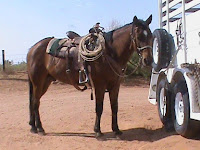Again this year we were able to get Randy Rieman to come down from Montana to do a Horsemanship clinic. This years clinic will be on Saturday and Sunday, 2-3 May 2020. His current prices are $150 per session which is a bargain in today's clinic costs.
Each day is two separate 3 1/2 hour sessions - one morning and one afternoon. I already have riders signing up to ride one horse on one day then a different horse the next day.
Randy rode with Tom and Bill Dorrance, and Ray Hunt, bringing that sort of approach to horsemanship. I meet and talk to horses owners a lot and it continues to surprise me that so many people have not heard of the Dorrance brothers, Ray Hunt nor all the top clinicians that their teachings have spawned, like Randy, Buck Brannaman, Bryan Neubert, Martin Black and many others. It just seems to me that if you are going to own and ride horses, even just for pleasure, then you would embark on a journey for knowledge which would led you to these gentlemen at some point.
In last years clinic, which was Randy's second visit to the El Paso, Texas - Las Cruces, New Mexico area, I think only one rider knew who Randy Rieman was prior to the first session. The others showed up on faith, and hope, that someone can make them better. Many of these riders were fairly accomplished in their own right - barrel racers, dressage competitors and team ropers.
Randy's clinic format's are such that there is no set format. He helps the horse and rider from where they are at, with what they need. It's problem solving at it's base. The education you can get from being helped, or watching someone with Randy's experience helping someone else, is priceless. A smart person never stops learning and a humble person knows it'll take a lifetime to learn what you want to know. These top shelf clinicians help speed up the learning curve. And as John Lyons told me one time, "People need to do less buying gear and more buying knowledge."
Two moments from last year's clinic are always fresh on my mind. One was a barrel racer who had issues backing her horse and opening gates. Randy helped her and her horse achieve those things, and at the end of the session with tears in her eyes, the rider commented - "this morning my horse was for sale, not anymore!" The second was a dressage rider whose horse does well being ridden in contact, but had the habit of speeding up just a bit - just wouldn't be consistent in keeping the same speed within that gait. Randy rode her horse and showed her how she could make her horse responsible for keeping the same gait and speed, and do so on a looser rein.
Anyway, if anyone is in the commuting area and wants a clinic slot, just get ahold of me. Or if you want to host Randy Rieman at your location, give Randy a call.























